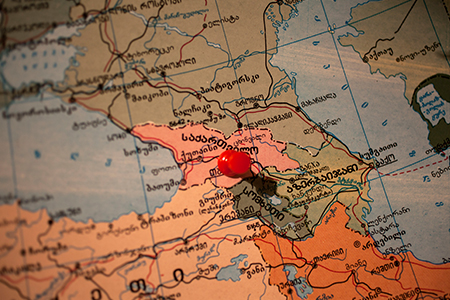US Mission to the OSCE sums up recent Int’l discussions on Georgian conflict

The Charge d’Affaires of the United States Missions to the Organisation for Security and Co-operation in Europe (OSCE) Kate Byrnes summed up the recent Geneva International Discussions today.
Security and humanitarian issues in the Russian occupied regions of Georgia – Abkhazia and Tskhinvali (South Ossetia) were discussed at the Geneva International Discussions on March 28-29.
Byrnes welcomed the continued functioning of the Gali and Ergneti Incident Prevention Response Mechanisms (IPRM), which have defused tensions on the ground in Russian occupied Georgian regions of Abkhazia and Tskhinvali (South Ossetia). She told the OSCE Permanent Council today that the US will encourage all parties to continue constructive negotiations aimed at achieving a mutually agreeable non-use of force statement.
The IPRM was created in February 2009 following the 2008 Russia-Georgia conflict to address security concerns and ensure the protection of human rights in the occupied regions.
The United States strongly encouraged participants to work together within the Gali IPRM to conclude the investigation into the May 2016 fatal shooting of a Georgian civilian along the Abkhaz Administrative Boundary Line (ABL),” she said, referring to the case of Giga Otkhozoria – a Georgian citizen who was killed in the village of Khurcha in Zugdidi last year.
Byrnes also said the US is concerned with the recent closure of two controlled crossing points along the Abkhazian Administrative Boundary Line (ABL).
De-facto Abkhazian officials closed these two crossing points along the occupation line separating Georgia’s breakaway, Russian-backed Abkhazia region from the rest of the country last month.
Up to now, three crossing-points along the occupation line were accessible: Enguri Bridge, Nabakevi-Khurcha and Otobaia-Orsantia. However, now only Enguri Bridge remains open.
These closures restrict freedom of movement and negatively impact the livelihoods of local residents. The United States calls for these crossing points to be reopened, allowing children to attend school and residents to move freely to engage in commerce, visit relatives, and obtain necessary medical services,” Byrnes said.
Calling on Russian authorities and Abkhazian and South Ossetian participants to reconsider these decisions, she said the March 12 de-facto parliamentary elections in Abkhazia, as well as Russia’s ongoing negotiations with Tskhinvali region to integrate military forces, and their April 9 de-facto presidential elections and referendum amending the territories’ name, "not only violate Georgia’s sovereignty and territorial integrity but also undermine the Geneva International Discussions.”
The US urges participants to look for practical steps forward to resolve humanitarian issues — including the core issues regarding IDPs, refugees, and returns — during future negotiations,” Byrnes said, reiterating that the US "fully supports Georgia’s territorial integrity, independence, and sovereignty within its internationally recognised borders.”
Since the Russia-Georgia war in August 2008, the Geneva International Discussions have been the only format of dialogue between Georgia and Russia.
It is chaired by the OSCE, the EU and the UN. Representatives from Tbilisi, Tskhinvali and Sukhumi, Moscow and Washington also take part in the discussions.
 Tweet
Tweet  Share
Share